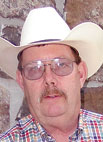 Many farmers and ranchers depend upon sale barns to purchase and sell their livestock. At the center of that process is the auctioneer whose task is to present and sell each animal for the best price possible. The process is rapid and requires intense concentration from both the buyer and the auctioneer.
Many farmers and ranchers depend upon sale barns to purchase and sell their livestock. At the center of that process is the auctioneer whose task is to present and sell each animal for the best price possible. The process is rapid and requires intense concentration from both the buyer and the auctioneer.
Kenneth Wilcox of West Fork, Ark., began auctioneering in 1976 and won World Livestock Auctioneer Championship in 1990. He is one of the few auctioneers who makes his living auctioneering rather than using it as a secondary income and currently auctions only cattle. During his career he has lived in Kansas and Texas where he met his wife, Claudette. He now travels to Tulsa on Mondays, Checotah on Tuesdays, and Apache, Okla., every other Thursday.
Kenneth never attended auctioneering school and ended up in auctioneering almost by accident. He had an uncle who was infatuated with the process, and Kenneth began to learn the process from Dittman Mitchell, his uncle’s friend, only as a way to entertain his uncle. Dittman had an old, cursive typewriter and typed out two pages of instructions on blue paper, which has since become one of Kenneth’s treasures. The instructions explained how to build a chant made up of numbers and filler words and advice on auctioneering.
One critical element is that the auction chant must be in the form of a question. Another is speaking plainly enough so everyone understands with speed being of secondary importance. Kenneth said, “Some may go off to auction school and think they’re going to start out as fast as a 20-year veteran, but learning auctioneering is like riding a bike. You ride slow and wobbly before you go speeding down the street.” Learning to breathe at the right times and quickly filling lungs with air is critical. Kenneth told the story of one friend who choked because he wanted to keep his rhythm and went too long without breathing. A final element of auctioning is knowing the value of the product being auctioned. This is important because the auction as a whole must keep moving and the auctioneer needs to respond to a reasonable maximum rather than persisting on to get more. Kenneth gave an example. Auctioning a pickup only worth $3,500 but grinding on to try to get $5,000 causes the audience to lose interest and focus which can then dampen bids for remaining items.
Kenneth’s first auction was selling tack before a horse sale at Dittman’s insistence. Kenneth said, “I practiced and practiced and then practiced some more. I sold for 30 minutes and got a huge round of applause when I finished. I was hooked.” Kenneth then began doing white elephant sales, pie suppers and slave auctions as charity work while finishing high school. After graduating he worked detailing cars and charity auctioning on the side. One day an auctioneer got appendicitis and the seller needed an auctioneer quickly and desperately. He asked Kenneth who explained he’d never really done an auction before. The seller pressed saying all he needed was a chant and a warm body. Kenneth smiled and said, “Back then it took four weeks to heal from appendicitis surgery, so I had a job for four weeks. It went well and I stayed.” Then he added, “The Lord leads in mysterious ways and this must be what he wanted. It’s a hard business to get into, but doors just kept opening for me.”
Kenneth said one of the interesting and entertaining things about being an auctioneer is never knowing what’s going to happen. One time he sold a ladder he had bought earlier in the week and had forgotten to take out of the barn. It sold for five dollars more than the purchase price even though the price tag was still attached. Another time a buyer found an old iron bed overgrown with leaves behind the barn on the farm where a sale was taking place. Kenneth said, “I was new at the job and sold it at a dollar a lick for $110. Now, of course I would know better and go from $1 to $5 to $15 and get to $100 in a hurry. That’s the thing about being an auctioneer, you get plenty of opportunities to make a fool out of yourself and I’ve done well at that.”
What Claudette especially appreciates about Kenneth’s career are the annual trips to Wyoming where Kenneth auctions at a huge annual event and where her family comes from. “Doubling up auctioning and visiting with friends and family is a great way to go,” said Claudette.
The one thing the words of the story can’t convey is the haunting, musical quality of Kenneth’s voice when auctioning. The term “chant” truly achieves its meaning when delivered by Kenneth.







